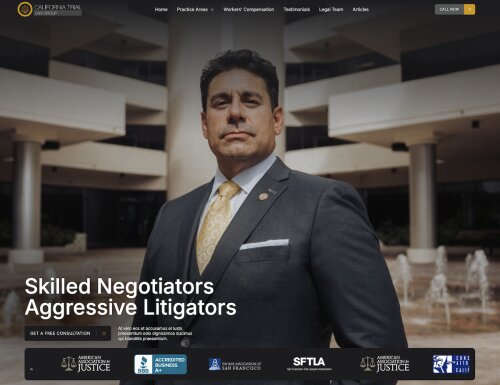Best Appeal Lawyers in Georgia
Share your needs with us, get contacted by law firms.
Free. Takes 2 min.
Or refine your search by selecting a city:
List of the best lawyers in Georgia, United States
About Appeal Law in Georgia, United States
In Georgia, United States, an appeal is a legal process that allows a party dissatisfied with a court decision to seek a higher court's review. Appellate courts in Georgia, such as the Georgia Court of Appeals and the Georgia Supreme Court, do not retry cases or consider new evidence. Rather, they review the legal procedures and interpretations of law applied in the trial court to ensure fairness and correctness. The appeals process is governed by specific rules and deadlines, making it a complex area of law that requires careful navigation.
Why You May Need a Lawyer
Appealing a case in Georgia can be complicated, with strict rules and time-sensitive procedures. Individuals may need legal assistance with appeals for several reasons, including:
- They believe the trial court made a legal or procedural error that affected the outcome
- They feel that their attorney did not provide effective representation during the trial
- There are questions regarding whether the evidence used was admitted properly or if relevant evidence was wrongly excluded
- The sentence or judgment imposed was excessive or not supported by law
- They need help filing post-conviction relief in criminal cases
- They want to understand whether appealing is a viable option based on the specifics of their case
- They are responding to an appeal brought by the opposing party
Given the technical nature of appeal law and the potential long-term consequences, consulting with a qualified appellate attorney is highly recommended.
Local Laws Overview
Georgia has a two-tier appellate system: the Georgia Court of Appeals and the Georgia Supreme Court. Appeals from most civil and criminal cases first go to the Court of Appeals, while cases involving constitutional questions, murder, or election controversies go directly to the Supreme Court. Appeals are not automatic in every case - some require permission from the appellate court through an application or discretionary appeal process.
Key features of appellate procedure in Georgia include:
- Strict deadlines for filing notice of appeal - commonly within 30 days of the trial court's decision
- Written briefs must be submitted to explain the legal arguments
- Oral arguments may be granted but are not guaranteed
- The record on appeal is limited to what was presented in the original trial court
- New evidence generally cannot be introduced at the appellate level
- Specific rules apply for criminal, civil, family, juvenile, and probate appeals
Frequently Asked Questions
What is an appeal in the Georgia legal system?
An appeal is a request for a higher court to review a trial court’s decision for legal error. It is not a new trial, but a review of the procedures and application of the law.
Can I present new evidence on appeal?
No. The appellate court reviews only the evidence and arguments presented in the trial court. No new evidence is allowed.
How long do I have to file an appeal in Georgia?
In most cases, you must file a Notice of Appeal within 30 days from the entry of the final judgment or order you want to challenge. Missing this deadline can forfeit your right to appeal.
What are the steps to start an appeal?
You begin by filing a Notice of Appeal with the court that issued the original decision. Then, the appellate court will review the record and briefs to determine if errors occurred.
Who reviews appeals in Georgia?
The Georgia Court of Appeals and the Georgia Supreme Court are the primary appellate courts. The specific court depends on the case type.
Do I need a lawyer for an appeal?
It is strongly advised to have an attorney who understands appellate law, as appeals involve detailed legal arguments and procedural rules that can be difficult to manage without legal training.
What types of cases can be appealed?
Most final decisions in criminal, civil, family, probate, and juvenile cases can be appealed, subject to certain limitations or requirements for specific types of cases.
What is the difference between a direct and discretionary appeal?
A direct appeal is one you have a right to file. A discretionary appeal requires you to ask the appellate court for permission to appeal, and the court can deny your request.
How long does the appeals process take?
Appeals can take several months to over a year, depending on the complexity of the case and the appellate court’s schedule.
What outcomes are possible in an appeal?
An appellate court may affirm the decision, reverse it, modify it, or send the case back (remand) to the lower court for further proceedings.
Additional Resources
If you need more information or assistance with an appeal in Georgia, the following resources may be helpful:
- The Clerk’s Office of the Georgia Court of Appeals - Provides procedural information and forms
- The Clerk’s Office of the Georgia Supreme Court - Helpful for cases under its original or discretionary jurisdiction
- Georgia Legal Services Program - Offers legal help to eligible low-income individuals
- State Bar of Georgia Lawyer Referral Program - Connects individuals with qualified appellate attorneys
- Public law libraries in Georgia - Provide access to legal texts and court rules
Next Steps
If you believe you may have grounds for an appeal, it is important to act quickly. Begin by reviewing your court documents and deadlines to ensure you are within the allowed time to appeal. Gather all records and case information related to your original trial. Then, consult with an experienced appellate attorney in Georgia to discuss the strengths and weaknesses of your case, possible strategies, and the likelihood of success. If you cannot afford private counsel, contact local legal aid organizations or the State Bar of Georgia for assistance. Taking prompt action and seeking professional guidance is key to protecting your legal rights in the appeals process.
Lawzana helps you find the best lawyers and law firms in Georgia through a curated and pre-screened list of qualified legal professionals. Our platform offers rankings and detailed profiles of attorneys and law firms, allowing you to compare based on practice areas, including Appeal, experience, and client feedback.
Each profile includes a description of the firm's areas of practice, client reviews, team members and partners, year of establishment, spoken languages, office locations, contact information, social media presence, and any published articles or resources. Most firms on our platform speak English and are experienced in both local and international legal matters.
Get a quote from top-rated law firms in Georgia, United States — quickly, securely, and without unnecessary hassle.
Disclaimer:
The information provided on this page is for general informational purposes only and does not constitute legal advice. While we strive to ensure the accuracy and relevance of the content, legal information may change over time, and interpretations of the law can vary. You should always consult with a qualified legal professional for advice specific to your situation.
We disclaim all liability for actions taken or not taken based on the content of this page. If you believe any information is incorrect or outdated, please contact us, and we will review and update it where appropriate.
Browse appeal law firms by city in Georgia
Refine your search by selecting a city.














